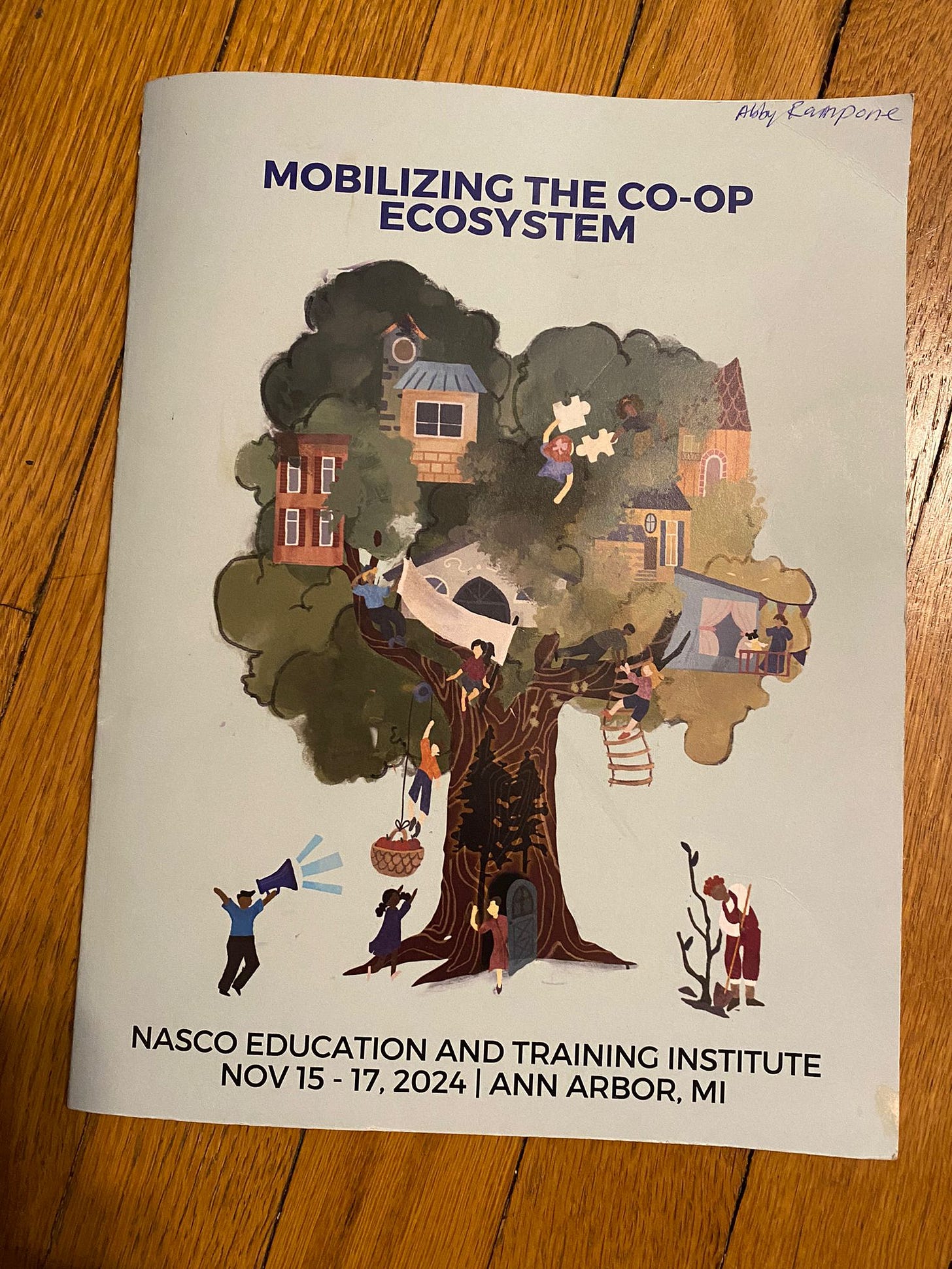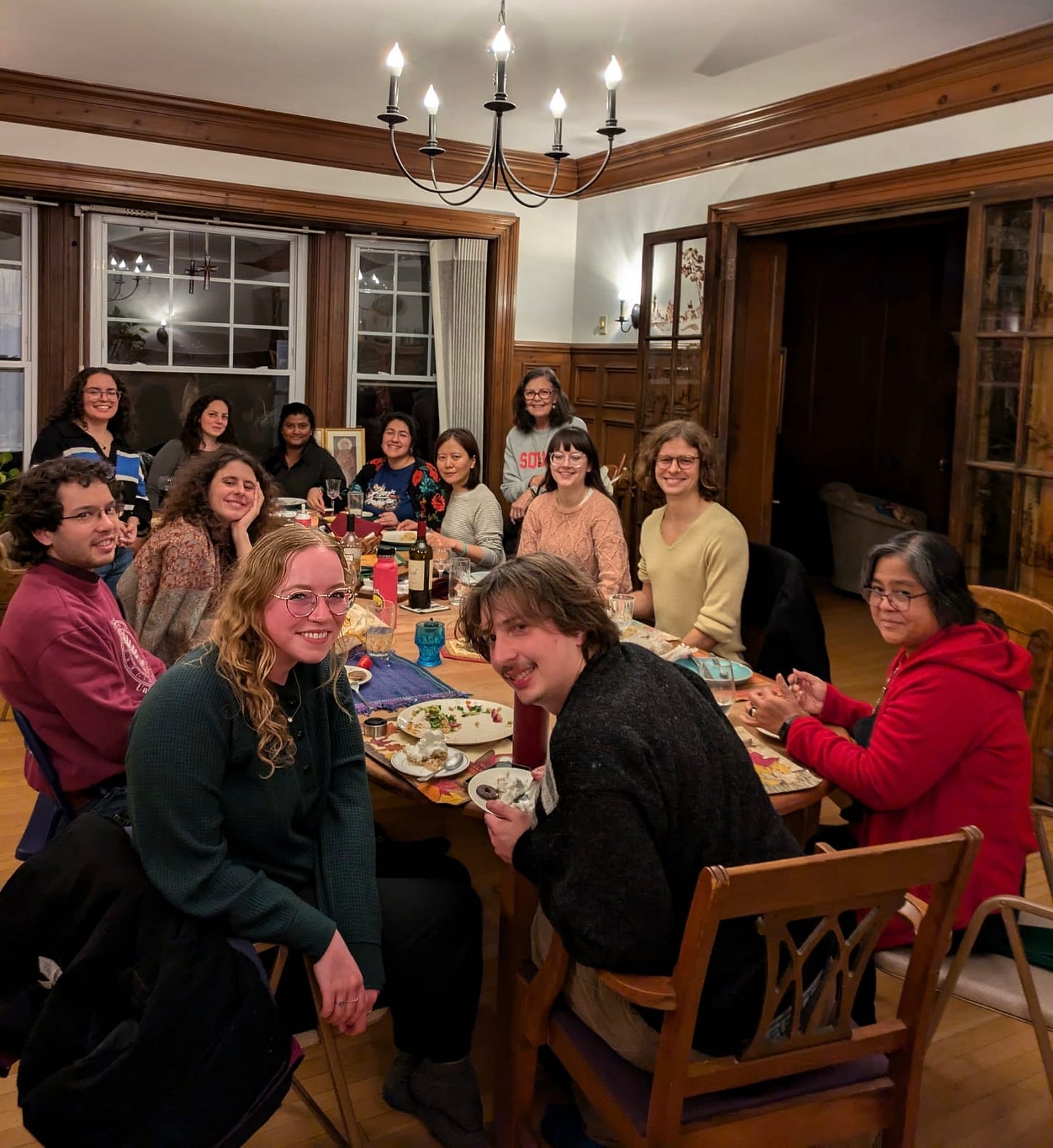NASCO Institute and the cooperative movement
Religious intentional communities have a lot to learn from cooperators.
Over the past year, I’ve become increasingly conscious of the disconnect between religious intentional communities and leftist, secular communities, especially co-ops. I’ve also become convinced that this is a problem for religious communities, revealing something critical about our weaknesses and growing edges.
When I say “co-op,” I’m referring to housing cooperatives. A housing cooperative is democratic and egalitarian. All residents have an equal share in the building’s ownership or management, and they make collective decisions about its operations. More generally, co-ops are by and for the people. In a worker co-op, there’s no boss; the workers themselves co-own the business and earn a share of its profits. Co-ops are socialist, communitarian, radical. What if we controlled our own housing and workplace? What if we even controlled our own churches? (I’ll get to that later.)
So last weekend, I drove to Ann Arbor, Michigan to attend the NASCO Institute and connect with co-opers from around the US and Canada. NASCO stands for North American Students of Cooperation. Established in 1968, it’s a network that educates and organizes co-ops to promote a community-oriented cooperative movement.
My boyfriend’s brother attended the University of Michigan, where he lived in one of the Inter-Cooperative Council (ICC) co-ops that house the University’s students. My boyfriend himself spent a summer living there with his brother, and left feeling energized about the co-op movement. The ICC is one of the largest student housing co-ops in the country, with sixteen properties in Ann Arbor. Their website boasts: “Because there is no landlord making a profit, the co-ops are the best deal in town.” There are close ties between the ICC and NASCO, so when I went to Ann Arbor for the Institute, I was offered solidarity housing at Escher House.

NASCO Institute was a big conference with all kinds of workshops, which ranged from the nitty-gritty details of incorporation and budgeting to cooking and consent workshops. I was inspired to chat with attendees and learn about their projects. One person is trying to build co-ops to address an affordability crisis in a small midwestern town. Another helped found a worker co-op of artists that is now planning to organize cooperative housing for its members. Co-op organizers from Denver were honored for their work, including advocacy that led to Colorado outlawing housing discrimination based on blood relationship. (Old laws effectively banned co-ops by limiting the number of unrelated adults who could live together, and those laws were disproportionately enforced against Black and Brown people.) I learned about co-ops revitalizing unused buildings, co-ops tailored toward neurodivergent people, and QTPOC-centered co-ops.
One striking thing about NASCO Institute was how familiar it felt. People commiserated about the challenges of communal living that all of us have experienced. How do you navigate disagreements about cleanliness and chore routines? What do you do when one person’s needs conflict with another person’s needs – for instance, when one person is severely allergic to cats but another person has an emotional support cat?
The familiarity of the NASCO Institute was striking because I have lived in four communities and never actually experienced anything like the NASCO Institute before. The religious communities I’ve been connected to are not part of the same movement. And I think one unfortunate reason for this is that religious communities don’t focus enough on how to share power.
The Catholic Worker movement isn’t particularly concerned with egalitarian, member-controlled houses, for instance. That’s not part of the movement’s tradition. The Catholic Worker professes anarchism, and anarchists resist hierarchy and central control. At many Catholic Worker houses, though, a de facto hierarchy emerges: Older, longer-term, and well-connected Catholic Workers have more power than newer, younger residents. Young adults often hear something like, “suck it up, buttercup – did you think living the Gospel would be easy?”
This bears further exploration (and I intend to explore it more at a later date), but I don’t think the collectivism of co-ops is incompatible with the anarchism of the Catholic Worker movement. It would challenge norms within the movement, but I think that challenge could be healthy and valuable.
This connects to my earlier point about collectively-governed churches: Democratic religious spaces are not a strong part of the Catholic tradition. Congregational churches are democratic. They elect their religious leaders. Members are accustomed to full participation in their religious community. In Catholic churches, member governance has hard limits. Parish councils report to the all-male clergy – and our churches don’t choose their clergy. We’re not used to flexing our self-governance muscles in religious spaces.
Because we’re so used to hierarchy, many progressive and leftist Catholics seem to react against hierarchy when we build alternative religious spaces. We say things like, “we want a community, not an institution.” While I resonate with this DIY ethos, I’ve seen Catholics throw the baby out with the bathwater, to disastrous results. We could learn and grow a lot from the cooperative movement, from the people who have spent decades figuring out how to build small-scale, local, functional institutions. A reflexive anti-institutional mindset is harmful because it prevents us from building sustainable alternative Catholic projects. And when we say things like “we’ll figure it out as we go along,” a lot of people can get harmed along the way. Lack of structure is not inherently anti-oppressive. Hierarchies and systems of oppressions will creep in no matter what. Egalitarian structures can actually empower us and resist the unspoken hierarchies that can fill a vacuum.
For religious communities to become cooperative, though, we’d need to decide that we actually want our communities to be egalitarian. It seems to me that many communities pay lip service to shared governance but actually think power should rest with a certain group, like elders, clergy, or an external governing body. This may be fine, as long as all members of the community can articulate this power structure and consent to it. In my experience, though, many communities do not want to name and claim the hierarchies that shape them. When we’re not used to it, talking about power and governance makes people uncomfortable. This is a recipe for disaster.
I don’t want to romanticize co-op life, though. Co-ops and intentional communities draw on different traditions, and while many co-ops emphasize community-building and healthy interpersonal relationships, others place less emphasis on these essential building blocks of intentional community life. Co-ops can also experience much of the same dysfunction and drama as other communities. At their best, though, they have the tools to work through these challenges. “Conflict is expected and welcome,” I heard at NASCO Institute. “Conflict management is not the same as conflict resolution because some conflicts can’t be resolved.” There were at least four workshops dedicated to conflict management at the Institute. Too often, I’ve seen communities (and myself!) retreat and crumble in the face of conflict. I was inspired by the willingness to engage it head-on.
I strongly believe that people who want to start communities (of all sorts) should attend a NASCO Institute to network and learn. Here’s the digital version of this year’s itinerary. I attended sessions about community organizing, the Fair Housing Act, taxes, and community conflict. There were sometimes nine workshops happening at the same time, so I felt like I had countless opportunities to participate.
This year, the Fireplace Community decided to add the phrase “cooperative housing” to its mission statement. This expresses our desire to build an egalitarian intentional community that structures itself to practice self-governance and shared power. We became a member of NASCO this fall.
The week after I went to the NASCO Institute, some of our neighbors from Bowers House, a co-op in the neighborhood, joined us for a Fireplace Community dinner. We went around the table and shared what we all love about community and cooperation. It was a space of networking and connection, across spirituality/religion, movements, and all sorts of difference. I think this is the way forward for the communities I love and believe in. Leftist and progressive religious intentional communities need to draw on this cooperative tradition. If we have not inherited it through our churches, we can find it elsewhere. Through cooperation, we can build stronger, healthier movements for change in our churches and our world.




